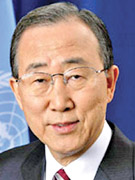Raising awareness of indigenous peoples'
The International Day of the World's Indigenous People's falls on
August 9 every year. The day provides an opportunity to raise awareness
of indigenous peoples' cultures and great diversity that they represent.
It is also an occasion to redouble efforts to address issues of
exclusion, discrimination and poverty that are still the daily reality
for many of these peoples.
|

United Nations’
Secretary General
Ban Ki-moon |
The day was designated by the United Nation's General Assembly in
December 1994. It commemorates the first meeting of the UN Commission on
Human Rights Working Group on Indigenous Populations held in 1982.
The term 'Indigenous Peoples' generally means native or original
inhabitants of a particular region or country often sharing a collective
identity. The indigenous peoples number over 300 million and represent
nearly four percent of the world's population. United by many common
experiences, including histories of marginalization and struggles for
cultural survival, they are nonetheless unique and distinct.
In his message to mark the day, United Nations' Secretary General Ban
Ki-moon says the world's indigenous peoples have preserved a vast amount
of humanity's cultural history as they speak a majority of the world's
languages and have inherited and passed on a wealth of knowledge,
artistic forms and religious and cultural traditions. Indigenous peoples
live in every region in the world. For many indigenous peoples, the
natural world is a valued source of food, health, spirituality and
identity. Land is both a critical resource that sustains life and a
major cause of struggle and even death. They live in more than 70
countries located in all regions of the world and speak over 4,000
different languages.
Among many indigenous peoples are the Indians of the Americas, the
Inuit and Aleutians of the circumpolar region, the Saami of Northern
Europe, the Aborigines and Torres, Strait Islanders of Australia, the
Maori of New Zealand and Veddhas of Sri Lanka.
Throughout human history, indigenous peoples have suffered as a
result of invasion of their land by dominant neighbours, colonial
expansion, modernization and now globalization. In recent years issues
affecting them have become more and more prominent on the international
agenda than ever before. More governments were seen taking measures to
redress their social and economic grievances.
"But we must do even more. Indigenous peoples still experience
racism, poor health and disproportionate poverty. In many societies,
their languages, religions and cultural traditions are stigmatized and
shunned.
The first-ever UN report on the State of the World's Indigenous
Peoples in January 2010 set out some alarming statistics. In some
countries, indigenous peoples are 600 times more likely to contract
tuberculosis than the general population. In others, an indigenous child
can expect to die 20 years before his or her non-indigenous
compatriots," points out the UN Secretary General.
Indigenous peoples have been working with the United Nations to name
and assert their collective rights for decades. The General Assembly
declares its first International Decade of the World's Indigenous
Peoples in 1994 and the 2nd in 2005. The UN Declaration on the rights of
the Indigenous Peoples was adopted by the General Assembly in 2007
following its adoption by the Human Rights Council in June 2006. |



